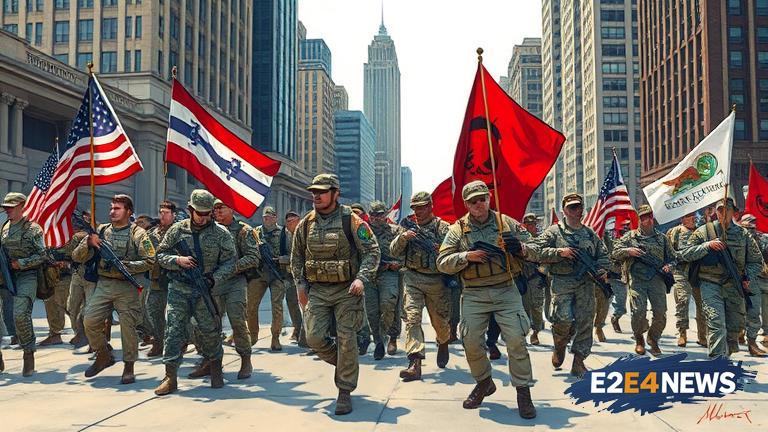In a recent development, Illinois Governor J.B. Pritzker and Chicago Mayor Brandon Johnson have pushed back against a proposal to deploy the National Guard in Chicago. The proposal, which aimed to address rising crime rates in the city, has been met with resistance from local leaders who argue that it would only serve to militarize the community and erode trust between law enforcement and residents. Governor Pritzker has stated that the deployment of the National Guard would be a ‘last resort’ and that other solutions, such as increased funding for community programs and social services, should be explored first. Mayor Johnson has also expressed concerns over the potential consequences of deploying the National Guard, citing the need for a more nuanced approach to addressing crime and public safety. The proposal has sparked a heated debate over the role of the military in domestic law enforcement, with some arguing that it would be an overreach of federal authority. Others have pointed out that the National Guard has been deployed in other cities to great success, and that it could provide a much-needed boost to local law enforcement efforts. Despite these arguments, Governor Pritzker and Mayor Johnson remain committed to finding alternative solutions to the city’s crime problems. They have proposed increasing funding for community programs, such as job training and mentorship initiatives, as well as expanding social services to address the root causes of crime. The city has also announced plans to increase the number of police officers on the streets, while also implementing new community policing strategies aimed at building trust and improving relationships between law enforcement and residents. However, some have criticized these proposals as being insufficient to address the scale and complexity of the city’s crime problems. The debate over the National Guard proposal has also highlighted the need for a more comprehensive approach to addressing crime and public safety in Chicago. This could involve a combination of increased funding for community programs, expanded social services, and targeted law enforcement initiatives. Governor Pritzker and Mayor Johnson have pledged to work together to find a solution that balances the need for public safety with the need to protect the rights and dignity of all residents. The city has a long history of struggling with crime and violence, and the current debate over the National Guard proposal is just the latest chapter in this ongoing saga. In recent years, Chicago has experienced a surge in violent crime, including homicides and shootings. This has led to widespread concern and calls for action from residents, community leaders, and elected officials. While the National Guard proposal has been met with resistance, it has also sparked a necessary conversation about the need for a more comprehensive approach to addressing crime and public safety in Chicago. The city’s leaders must now work together to find a solution that prioritizes the needs and safety of all residents, while also addressing the root causes of crime and violence. This will require a sustained commitment to funding community programs, expanding social services, and implementing targeted law enforcement initiatives. It will also require a willingness to listen to and engage with the concerns and perspectives of all stakeholders, including residents, community leaders, and law enforcement officials. By working together and taking a comprehensive approach to addressing crime and public safety, Chicago can build a safer, more just, and more equitable community for all. The city’s leaders must now seize this opportunity to make a positive difference in the lives of all residents, and to create a brighter future for generations to come. The proposal has also raised questions about the role of the federal government in addressing crime and public safety in Chicago. While some have argued that the federal government should play a more active role in supporting local law enforcement efforts, others have expressed concerns over the potential for federal overreach and the erosion of civil liberties. Governor Pritzker and Mayor Johnson have emphasized the need for a collaborative approach to addressing crime and public safety, one that balances the need for federal support with the need to protect the rights and dignity of all residents. The city’s leaders must now navigate this complex landscape, working to find a solution that prioritizes the needs and safety of all residents, while also respecting the principles of federalism and the rights of all individuals. The debate over the National Guard proposal has also highlighted the need for greater transparency and accountability in law enforcement. This could involve the implementation of new policies and procedures aimed at promoting police accountability, as well as increased funding for community-led initiatives and social services. By prioritizing transparency, accountability, and community engagement, Chicago can build a more just and equitable system of law enforcement, one that prioritizes the needs and safety of all residents. The city’s leaders must now work together to make this vision a reality, and to create a brighter future for all residents. The proposal has also sparked a wider conversation about the need for a more comprehensive approach to addressing crime and public safety in the United States. This could involve a combination of increased funding for community programs, expanded social services, and targeted law enforcement initiatives. It will also require a willingness to listen to and engage with the concerns and perspectives of all stakeholders, including residents, community leaders, and law enforcement officials. By working together and taking a comprehensive approach to addressing crime and public safety, the United States can build a safer, more just, and more equitable society for all. The city’s leaders must now seize this opportunity to make a positive difference in the lives of all residents, and to create a brighter future for generations to come.





